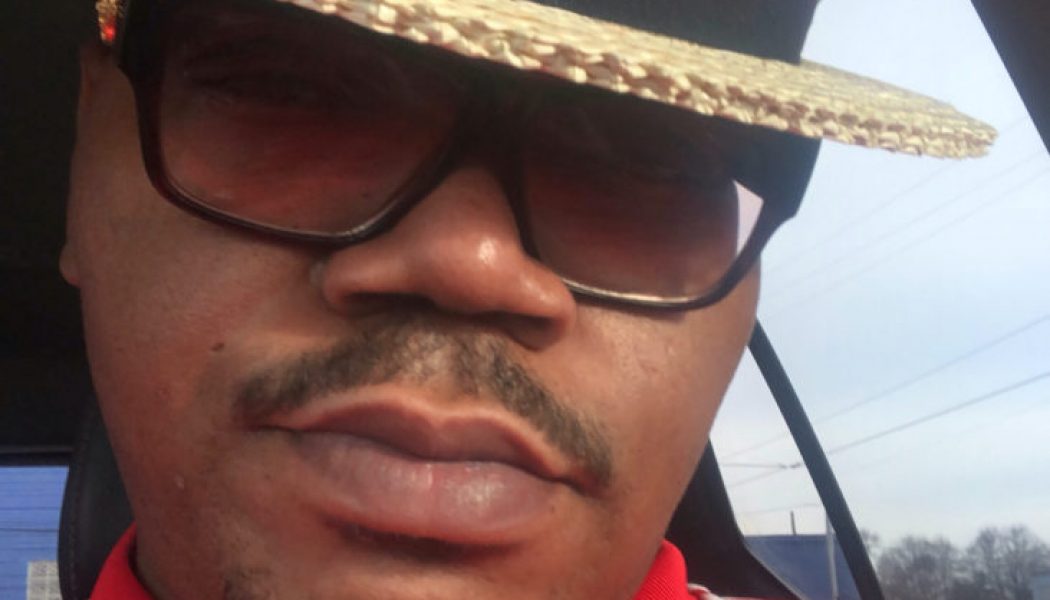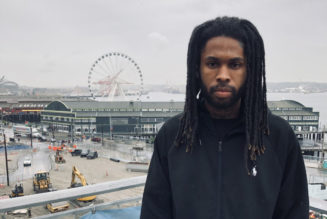
Blue Chips is a monthly rap column that doubles as a scouting report. Each month, SPIN selects a rapper (or group of rappers) who could be Rookie of the Year candidates turned Hall-of-Famers or forgettable flashes in the pan. Only the passing seasons (and the number of streams) will tell. To read previous columns, click here.
Rap is rife with songs that celebrate the fast money and material goods drug dealing can afford. Just as many, though, weigh powders, pills, and profits next to the threat of death or life imprisonment, the pressure of providing for a family, and the psychic toll of watching fiends whittled to bone. Bruiser Wolf knows every side of the game.
“We can’t always have the highs of the dope game. We can’t always be getting money,” the Detroit-based rapper says over Bluetooth, his car parked in front of the studio. “Some of that shit is funny to people, but I’m really being serious [in my music].
A former journeyman Arena Football player, Wolf turned to hustling when he suddenly became the sole provider for his two infant daughters, two younger brothers, and ailing mother. Today, gladly long-retired from all illicit businesses, the 39-year-old owns a landscaping company in Detroit, where he intermittently coaches youth and high school football. Between raising children, calling plays, and razing trees, Wolf collaborated with Bruiser Brigade’s Fat Ray and caught the attention of Danny Brown — the lyrically devastating, sonically eccentric, and critically-lauded Detroit rapper who founded Bruiser Brigade Records.
“… [W]hen I first heard him, I was blown away. I’m all about taking influences and making them your own, so I knew if I got him on the right production we can make something special,” Brown says. “I’m honored to work with him. He inspires me to work harder with my writing.”
Dope Game Stupid, Wolf’s debut album and the third on Brown’s nascent Bruiser label, is one of the most hilarious, well-crafted, and ultimately heartbreaking rap albums in recent memory. This is rap for people who find Griselda too dour and impenitent, for anyone who believes every coke metaphor has been cooked. Executive produced by Brown and produced almost entirely by Raphy (a member of producer collective Detroit Lines), it’s also an album-length exercise in using humor to conceal and distract from years of pain.
Scored by Raphy’s open and loop-driven beats, Wolf often details moving weight like an avuncular Pusha T raised on Suga Free’s Street Gospel. His voice — a singular and incongruous hybrid of E-40’s helium-inflated resonance, Free’s exaggerated pimp lilt and conviction, and Cee-Lo’s thin, strained rasp — can make even the grimmest lines seem light.
“People want to compare you to something great when they’ve never heard nothing like you,” Wolf says, after relaying his reverence for the artists to whom he’s been compared. He then deploys a sports analogy that mirrors the many in his lyrics. “I’m like Lebron. They don’t know whether to call me Jordan or Magic.”
Despite Wolf’s protestations, innumerable clever lines seem intentionally comedic (e.g., “So tell a fiend to tell a friend / I’m connected with the white like skeletons” – “I’m A Instrument” or “This the Bruiser, and we keep plenty / I’m synonymous with the white girl, ask Wendy” – “Chess Move$”). By the end of the album, however, every punch line becomes a gut punch. On the Knxwledge-produced closer, “Momma Was a Dopefiend,” Wolf shares the literal and figurative scars left by his mother’s drug addiction, the cruel irony that he briefly became a dealer to financially support her later in life: “It’s a shame, I sell the same thing that caused us pain / It’s a fucked up game.”
Shortly after Wolf was born, his mother abandoned him, his two older brothers, and father. His father worked as a janitor and pushed the boys into sports, spending his time at home playing soul/R&B from the Stylistics and Blue Magic and reciting Langston Hughes’ poem “Motto” so often Wolf memorized it. Wolf gravitated to rap in grade school, watching and imitating his older cousin’s group, Criminals of America. Then, he moved on to rap groups like Camp Lo and Nice & Smooth. On Dope Game Stupid, there are traces of the latter’s Smooth B in Wolf’s languorous cadences and the pregnant pauses he takes between bars.
Though he rapped with teammates between huddles, Wolf was intensely focused on cracking heads as a center and nose tackle. An All-City and All-State offensive lineman in high school, he played at Clark Atlanta, where he made the Pre-Season All-SIAC Football Team. Wolf dropped out and dabbled in dealing, but he rededicated himself to and made the roster for a handful of arena football teams. By the end of his 20s, though, no NFL teams called.
Dejected and lost after his football dreams dissolved, Wolf had little time to sulk or plan. He had two daughters as he entered his 30s. His mother, who had two sons after him, was a diabetic who suffered so badly the doctors resorted to amputation. While his mother’s health declined, Wolf took charge of his younger siblings and footed the bill for the convalescent home where she eventually passed. “It’s hard to talk about the pain behind this album,” he says, his voice shaking and on the verge of tears as he discusses the events that lead to him hustling full time. “I had so much on my plate. What could I do? I wanted to be a good son.”
In his early 30s, with one foot still in the game, he began rapping in earnest. Isolating himself from every friend and family member who doubted him, Wolf recorded at local studios and freestyled at showcases before releasing 2014’s D.O.P.E. (Do Our People Exist), which features a song titled “Dope Game Stupid.” Wolf doesn’t consider this rough collection of songs his debut, but they showed promise.
Five years and one Fat Ray collaboration later, Wolf met Brown while performing “Old Faithful” at Brown’s 2019 Bruiser Thanksgiving. Their connection was immediate, and Wolf took the fall and winter of 2020 — a slow time for landscaping in any year — to record Dope Game Stupid. He praises Brown for his insight, encouragement, and direction. Quick to applaud Raphy’s production, Wolf also thanks him for grinding out marathon recording sessions and kindly steering him away from beats that would clash with the album’s cohesiveness.
Dope Game Stupid is arguably the best dope rap album in years, a record so unique, funny, and gripping that Wolf may have to put landscaping on hold indefinitely. Though he raps about his past, he’s adamant that it doesn’t define him.
“I don’t ever want to be looked at as a retired dope dealer. I always put more focus on being a righteous man than doing that. That is a skeleton, something that I had to do to provide and survive.”










